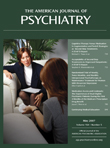An Intensive Treatment Program of Interpersonal Psychotherapy Plus Pharmacotherapy for Depressed Inpatients: Acute and Long-Term Results
Abstract
Objective: The purpose of this article was to determine the relative efficacy of a psychotherapy program when combined with pharmacotherapy versus medication and clinical management in more severely depressed patients. Method: A randomized controlled trial was conducted in 124 hospitalized patients with DSM-IV major depressive disorder that compared 5 weeks of interpersonal psychotherapy modified for depressed inpatients (15 individual and eight group sessions) plus pharmacotherapy with a regimen that involved medication plus intensive clinical management. The study included a prospective, naturalistic follow-up 3 and 12 months after acute treatment in 97 of 105 treatment completers. The 17-item version of the Hamilton Depression Rating Scale (HAM-D) was the primary outcome measure. Results: For the intent-to-treat cohort (N=124), analysis of covariance (ANCOVA) showed that patients treated with interpersonal psychotherapy had a significantly greater reduction of depressive symptoms at week 5. Response rates differed significantly between the two treatment conditions, favoring the group that received adjuvant interpersonal psychotherapy (70%) versus clinical management (51%). Remission rates also tended to be higher for patients in the interpersonal psychotherapy group (49% versus 34%). Patients who initially responded to interpersonal psychotherapy exhibited greater treatment gains at the 3-month follow-up evaluation, since only 3% of these subjects relapsed, compared with 25% of the clinical management subjects. Nine months later, this difference lost statistical significance. Conclusions: An inpatient treatment program with both brief and intensive psychotherapy plus pharmacotherapy is superior to standard treatment. The results, which add to a growing body of evidence, suggest that this combination treatment may offer an advantage over treatment with medication and clinical management for more severely depressed patients.



